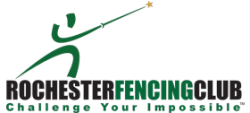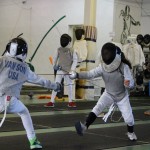
Rest and Recovery
As the Summer National Fencing Championships draw near, it can be tempting for many athletes preparing for competition to train as much as possible in order to be ready. At this time, maybe you don’t feel like your footwork is as fast as it could be, or your conditioning could be better still. Well, of course it can. We can always be better. However, one very important aspect of training to keep in mind is the amount of rest and recovery you’re including.
Often, the point at which athletes reach overtraining (and become burnt out) is usually as they lead up to their biggest competition of the season. Many athletes struggle with getting enough rest, not because they don’t realize it’s importance, but because they often feel guilty for taking a day off training. When your life is filled with a go-go-go mentality, especially as a student-athlete, it can feel uncomfortable to have a rest day where it feels like nothing is being accomplished.
The truth is that there is a lot being accomplished on a rest day. Not only are you providing yourself with a mental break from training, but physiologically, your body is busy at work repairing damaged tissue and replenishing energy stores in your muscle cells. Without this rest, your body will continue to break down tissue without the ability to repair itself. This leads to the fatigue and weakness experienced in overtraining. The whole purpose of training is to place a specified amount of stress on the body so it promotes adaptation. This is a balancing act between exercise (physiological stress) and rest (tissue repair). Too much of one or the other will result in unsuccessful training.
No doubt by now you realize the importance of rest in your training regimen. Next are some guidelines on how to better include and monitor rest as a component to your training.
Rest and Recovery
Rest and recovery are actually two different things. Rest refers to the state you are in when sleeping or not training. Whereas, recovery is generally a more purposeful aid to your training. Recovery can be long term or short term, and can include the active recovery (see the next section) taken after an intense workout, as well as care for injuries (stretching, ice, compression, etc), and planned rest periods in your training schedule.
Short-Term and Long-Term Recovery
As mentioned above, there are too forms of recovery. Short-Term recovery refers to the period immediately following an intense bout of exercise (up to two hours post workout) and can also be referred to as active recovery. After an intense practice, provide yourself with 15 to 10 minutes to cool down, this can include light footwork, jogging, stretching, and allows your cardiovascular and muscular systems to ramp down slowly and transition into rest.
Long-term recovery refers to periods built into your training season that include days or weeks of rest scheduled into your year-round athletic program.
Zzzzzzz….
Sleep is absolutely critical to reaching peak performance. Studies have shown that sleep deprivation in athletes can lead to reduced levels of aerobic endurance and can increase stress hormones. As you approach your competition, make sure you are getting 7-8 hours of sleep regularly. (And for those student-athletes with finals approaching along with National Championships, studies have also shown that sleep aids in memory retention, so study early and get enough sleep instead of pulling all-nighters!).
Nutrition
Just as important as the food you fuel yourself with pre-training, your post training meal can make a huge difference in your recovery process. Immediately after intense exercise, your body is already working to replenish it’s energy stores. Plan on a post workout snack (something rich in carbohydrates to aid those glycogen stores) within 15 minutes following intense training, and again within the next hour post workout (or dinner depending on the timing of your training). For excellent information on how to incorporate nutrition into your training read Nancy Clark’s Sport’s Nutrition Guidebook (Nancy Clark, MS, RD).
Monitoring
Just like you monitor the amount you practice each week, track the amount of time you take for rest and recovery. Pay attention to how your body feels throughout your training and take note of changes in your energy level. If you feel fatigued at all times, it could mean you need to adjust your training schedule. As always, consult with your coach about your training to rest ratio. By the time you reach your competition you want to feel excited, healthy, and ready.



